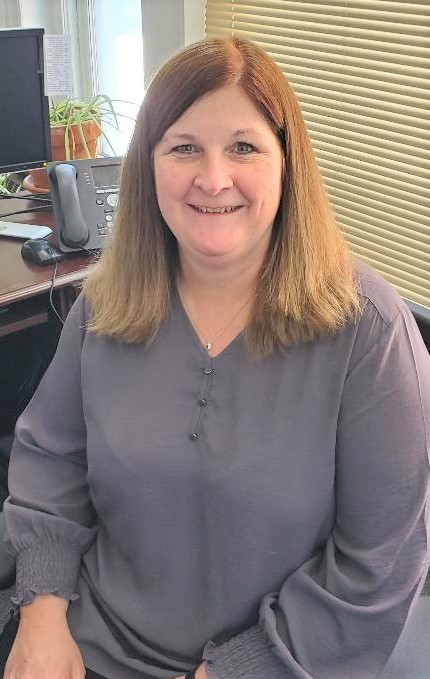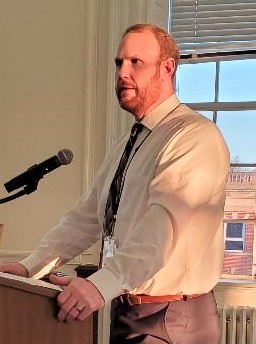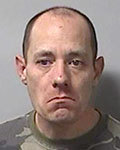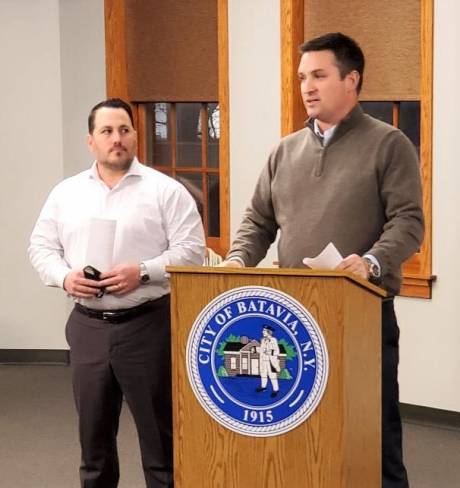Video Sponsor
.pane-node-body img {background: none !important; border: 0 !important; margin: 0 !important; padding: unset !important; padding-left: 1px !important }
broadstreet.zone(69076)
Give Jesse Coots a couple of hours and he will find plenty to say. The Pavilion native’s enthusiasm is infectious, whether it’s about his family, hot rod shop, or a new campground venture slated for later this year.
The 45-year-old entrepreneur and his wife Jolene are eagerly mapping out their Lokee-Hikee Campgrounds project at 10156 Perry Rd., Pavilion. It seems rather easy to start daydreaming of packing up the camper as the Coots verbally paints a picture of their vision: friends, families, campfires, slowing down, relaxation, swimming, catching frogs, and taking scenic hikes in the great outdoors. The site’s tagline perhaps says it all: “We’ll leave the stars on for you.”
“We really live in a great area. We love Pavilion, it's where I'm originally from. I mean, we've lived here for 20 years. It's kind of where we really wanted to be,” Mr. Coots said during an interview with The Batavian Saturday at the family’s 1800s farmhouse. “We walked the property and it's perfect. It' in a great location, it's on a back road, but … there's a lot of main roads that run right by it. So it's a very accessible spot, and the land itself is perfect. It's really a great spot, it's got great terrain. So I'm really excited about it.”
Low Key, High Key …
That piece of land is 110 acres — and an estimated $250,000 investment so far — requiring a special use permit, engineering, land surveys, drilling for wells, securing town board approval and doing everything they can to ensure the site will be environmentally sound and neighbor-friendly, he said.
Providing a fun, family-friendly campground has been a dream-in-the-works for the last five or six years, the couple said. They began scouting properties a few years ago, from Alexander and Batavia to Caledonia and found the ideal property practically in their own back yard. But they were a step too late; it had already been purchased. Mr. Coots congratulated the new owner and admitted that it was a great parcel of land.
Fate took a turn, and that owner changed his mind, notified the Coots, and put it back up for sale. There was no misstep this time, and the Coots became the proud owners of property that’s only three miles away from their home.
Jesse and Jolene walked the property with some friends who are avid campers, and they gave a nod of approval.
“They're like ‘you couldn't have picked a better piece of land,’” Mr. Coots said.
The first phase of the project is a section of 26 acres for about 80 campsites, a registration building, bathroom and shower facilities, a pool, and a stocked pond large enough for paddle boats, swimming, fishing, and skipping stones. There are also to be a host of jobs for people — especially youth — to keep busy and gain work experience. The Coots want to provide that type of wholesome family experience for their three girls and the community.
The special use permit has been a sticking point so far, as a prior hearing was rendered null and void after the board asked for the application to be completed again, Mr. Coots said. Another hearing has been set for 7 p.m. Wednesday at Pavilion Town Hall, 1 Woodrow Drive, Pavilion. (See “What’s in a Plan?”)
The name Lokee-Hikee has a touch of Native American appearance in it that appeals to the nature-loving, outdoorsy Coots family. It also is a play on words to imply a sense of low key relaxation with high key fun, energy, and friendliness, he said.
Mrs. Coots, the quieter one of the couple, created the logo of five trees representing the family, silhouetted against a sunrise with the tagline about the stars. She complements her husband by filling in the creative gaps. It was the three girls — Cricket, Trilly, and Souly, 14, 12, and 11, respectively — who reminded their folks that they appreciate the seemingly small stuff. The girls texted mom and dad one morning and told them to look at the sunrise. Likewise, the girls have asked their parents to check out the stars on particular nights.
“I love that my kids know enough to look at the sunrise and go ‘this is beautiful.’ And it's the same with the stars,” Mr. Coots said. “It's like, that's what camping is about. And that's what we want to expose kids and people to, because it seems that in our fast pace in life, you forget to enjoy the stars.”
The girls shared their excitement for the project with reasons of meeting new people, getting to play outside and help out, and, no doubt, enjoying some chocolatey S'mores.
Who are Jesse and Jolene Coots …
It was, no doubt, his zeal for car rebuilds and providing hospitality that helped Jesse’s Hardcore Happenings event to mushroom in size and importance. The gathering has been a longstanding yearly opportunity to show off one’s classic car, eat some picnic fare and enjoy the camaraderie of fellow hot rod lovers.
He has owned and operated The Old Soul Hot Rod Shop for more than a dozen years next to his home in Pavilion. Rebuilding and working on 1930s to 1950s era vehicles has been a passion since he started doing it in high school.
Mrs. Coots, 44, is a massage therapist with a plan to offer her services at the campground. The three girls, plus dogs Trixie and C.C. (for chocolate chip), some chickens, bunnies, fish and a rooster, round out the family homestead.
A glitch with the Planning Board aside, the Coots have been pleased with everyone they’ve encountered, from the Department of Environmental Conservation and Genesee County Health Department to well-drillers, topographical surveyors and Army Corps of Engineers.
“We have really gone through the steps of making sure we're doing everything right legally (with all entities involved). They have been fantastic to deal with. It's our engineering that our Town of Pavilion is obviously involved in, and wants to make sure we're doing everything right,” he said. “So we have the entire product. They've made us engineer everything. So we have hired (Engineer Sara Gilbert), and she has been heaven-sent.”
This labor of love will come down to the Planning Board, he said, and whether board members want the land available for the Coots' dream-come-true campground.
“Of course we would like people to be able to come and, you know, if they want to buy a membership they can have coffee there, they can use the hiking trails … we plan on having disc golf and different things like that for people to do,” he said. “And we know we're going to have, obviously, a swing set and stuff for kids, and we'd like to be able to open that to the community to use.”
The Coots family has been charging forth with the plan despite a small handful of Perry Road area neighbors complaining with signs advocating for no campgrounds and a rumored petition being circulated against the project.
Mr. Coots said that he and his engineer have ensured not only the recommended setbacks but increased that to be amply compliant. For example, the required minimum of 25-foot setbacks has been lengthened to 150 feet, he said. And there will be no Hardcore Happenings, live concerts, or loud parties allowed on the property, Coots said.
“So that's kind of one of the reasons we went after the campground idea because it is a family and community kind of thing; we can all work together,” Mr. Coots said.
“We wanted a piece that was of large size … so it could be wide open and free and not be intrusive on the neighbors and also not having our guests be crowded,” he said. “We can really spread it out and make it a beautiful place and let everybody have lots of freedom and space.”
Middle photo by Howard Owens. Jesse and Jolene Coots, shown here with daughters Cricket, Trilly, and Souly, pose outside of their Pavilion home.
Photo courtesy Jesse Coots.














